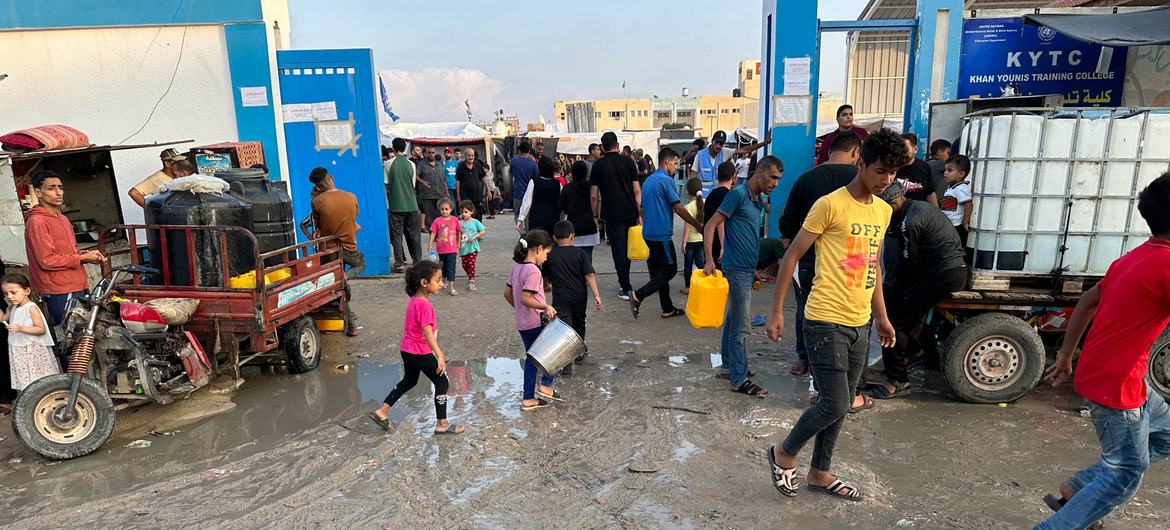
Published 11/06/2023 18:02 | Edited 11/07/2023 16:13
In a rare demonstration, the heads of the 18 humanitarian agencies that make up the United Nations called in unison for a humanitarian ceasefire in the Gaza Strip and stressed that leaving an entire population without food, water and electricity is an atrocity as great as the murder of Israeli civilians.
But the statement also expresses the denunciation of Israel’s violations of international humanitarian law, each time it bombs an ambulance convoy, a refugee shelter or a hospital. The note is full of reports that demonstrate how explicit the aggression against Palestinian civilian lives is.
The text is another cry between bombings, which is released as no international appeal sensitizes Israel and the USA. All UN mechanisms have been ineffective in reducing Palestinian suffering. The note is signed by the heads of the World Health Organization, Unicef, CARE International, Save the Children, the World Food Program and the United Nations Office for the Coordination of Humanitarian Affairs (OCHA), among others.
The UN is also paying a huge human cost in this war, with 88 United Nations Palestinian Refugee Agency (UNRWA) staff killed in Israeli attacks. This is the highest number of United Nations fatalities ever recorded in a single conflict.
UN humanitarian coordinator Martin Griffiths; the high commissioner for refugees, Filippo Grandi; the director general of the World Health Organization (WHO), Tedros Adhanom Ghebreyesus; and UNICEF Director-General Catherine Russell, among many others, called for respect for the lives of civilians, the infrastructure on which they depend, the release of hostages and the permission for essential humanitarian aid to enter Gaza.
“We need an immediate humanitarian ceasefire. It’s been 30 days. Enough. This must end now”, they demanded.
Dead and missing
Amid reports of massive explosions caused by air strikes in northern Gaza overnight on Sunday, UN agencies reiterated that all parties must respect obligations under international humanitarian law.
United Nations humanitarian leaders stressed that “the entire population is besieged and under attack, without access to the essentials for survival, bombed in their homes, shelters, hospitals and places of worship”.
“This is unacceptable”, highlights the statement released this Sunday.
According to the Palestinian Ministry of Health, the death toll since October 7 has reached 9,770, including 4,008 children and 2,550 women.
Some 2,260 people, including 1,270 children, are missing in Gaza, most of whom are believed to be trapped under the growing amount of rubble.
Bread line bombing
The Office of Humanitarian Affairs, Ocha, reported that in Gaza people are putting themselves at risk during airstrikes so they can line up outside bakeries in the hope of buying bread.
According to Ocha, several solar panels on the roofs of buildings were reportedly destroyed by Israeli airstrikes in recent days. This eliminated one of the few remaining sources of energy for hospitals and water and food production.
On Sunday night, Ocha reported that “over the past 24 hours, attacks have continued in the vicinity of hospitals, including the Indonesian Hospital and Al Quds Hospital,” resulting in injuries and damage.
More than 100 attacks on healthcare facilities, killing or injuring close to 1,000 people, were reported as of November 4, according to the World Health Organization, WHO.
UN Secretary-General António Guterres said on Friday he was “horrified” by an attack in Gaza on a convoy of ambulances outside Al Shifa hospital on its way to the Rafah border crossing, where medical evacuations of patients injuries towards Egypt began last week.
The bombings were also condemned by the WHO, which recalled that attacks on health services, “including attacks on hospitals and restrictions on the delivery of essential aid, such as medical supplies, fuel and water”, constitute violations of international humanitarian law.
Medical evacuations interrupted
Ocha said Friday’s attack on the ambulance convoy was followed by a complete halt to the exit of injured dual nationals through Rafah.
According to the agency, no further evacuations were reported from Gaza over the weekend, due to “the failure of Hamas, Israel and Egypt to reach an agreement on the safe evacuation of patients from northern Gaza.”
Although 14 of the 35 hospitals in Gaza have stopped functioning, more than 23,000 people have been injured in Gaza since October 7 and require treatment.
Growth of diseases
More than 700,000 of the 1.5 million internally displaced people across the Gaza Strip are sheltering in 149 facilities run by the United Nations Relief and Works Agency for Palestinian Refugees, Unrwa, which are severely overcrowded.
Several cases of acute respiratory infections, diarrhea and chickenpox were reported among people taking refuge in agency shelters.
Water scarcity, which is particularly acute in the north of the enclave, “raises concerns of dehydration and water-borne diseases due to the consumption of water from unsafe sources”, warned Ocha. According to municipal authorities, the risk of sewage leaks is imminent.
No access to the north
Unrwa lamented the fact that its shelters have been repeatedly hit by Israeli attacks and are no longer safe for those seeking refuge. On Saturday, an agency school in Jabalia camp, north of Gaza city, was directly hit by attacks that killed 15 people and injured 70.
The agency said more than 160,000 displaced people were sheltering in 57 of its facilities in Gaza City and North Gaza province as of October 12, before the evacuation order issued by Israeli authorities.
However, Unrwa warned that it “does not have access to these shelters to help or protect internally displaced people and does not have information about their needs and conditions”.
The agency mourns the loss of 88 of its staff since October 7, the highest number of United Nations fatalities ever recorded in a single conflict.
Source: vermelho.org.br

